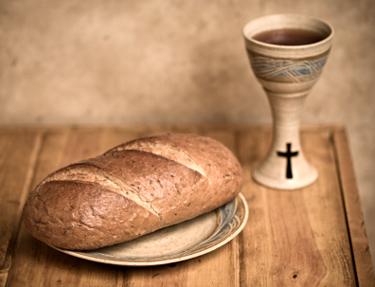(This blog is part of a series. See my blog entitled "Worship Formation" posted on August 31, 2012 for the introduction to the series)
Let me begin by asking an important question: “does repetition diminish the meaning of a worship element and hinder spiritual formation from taking place?” I wanted to ask this question because this is a very common inquiry when it comes to Communion, also called Eucharist. It seems to be the prevalent theme for the debate on the frequency of participating in the Lord’s Table: “If it’s done too regularly, it becomes rote and it doesn’t mean as much.” Robert Webber thoughtfully answers this question, “The celebration of bread and wine is no abstract object out there, no thing to be observed as an object of interest, no mere ritual to be taken in a perfunctory or mechanical way. No. We move from a delightful contemplation of all that bread and wine disclose to a participation in God's story by continually affirming in bread and wine that Jesus is given anew and poured out again to the world through our individual lives and through the community of the people of God, the church, who manifest God's purposes for the world in the worship of our lips and lives.”[1]
Our time of worship at the Table should leave us changed. For when we enter the presence of God, our hearts should burn within us as we remember that the one who was crucified, dead, buried, and rose again, is now alive and within us. This leads the worshiper to the mysterious greatness of God found at the Table.
When we come to the Lord’s Table we remember all that Christ has done for us and we give thanks for His atoning sacrifice. Giving thanks at the Table is the meaning of the word Eucharist (“act of thanksgiving”). At the Table we ponder the atonement found in Christ through his death on the cross. Yet we are invited to a greater understanding that we do not find our atonement strictly through Christ’s sacrifice, for in fact, Christ Himself is our atonement. Through this process, we are being transformed as we are drawn closer to Christ. We remember, as we are instructed to do,[2] His suffering, death, resurrection and the entirety of His salvation story. “What nourishes and transforms us at bread and wine is the disclosure of the whole story of God - creation, incarnation, re-creation - which takes up residence inside of us as we take and eat, take and drink. For in this symbol a reality is present - the divine action of God redeeming his world through Jesus Christ . . . We become what we eat - living witnesses to Christ who lives in us.”[3]
Henri Nouwen sums it up: “Communion with Jesus means becoming like him. With him we are nailed on the cross, with him we are laid in the tomb, with him we are raised up to accompany lost travelers on their journey. Communion, becoming Christ, leads us to a new realm of being. It ushers us into the Kingdom.”[4]
[1] Webber, Ancient-Future Worship, 147.
[2] 1 Corinthians 11:23-26
(NIV)
[3] Webber, Ancient-Future Worship, 146.
[4] Nouwen, With Burning Hearts, 94.

